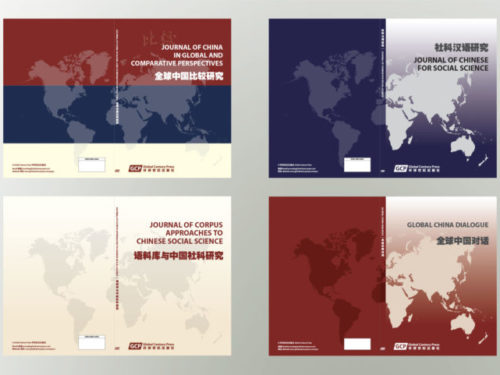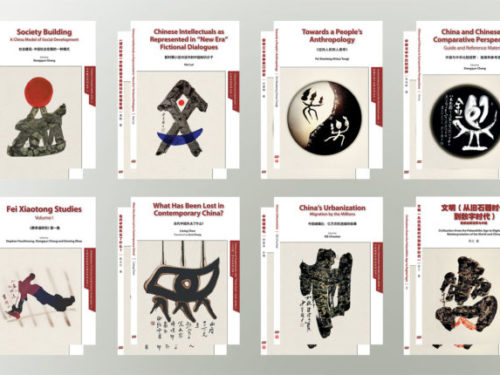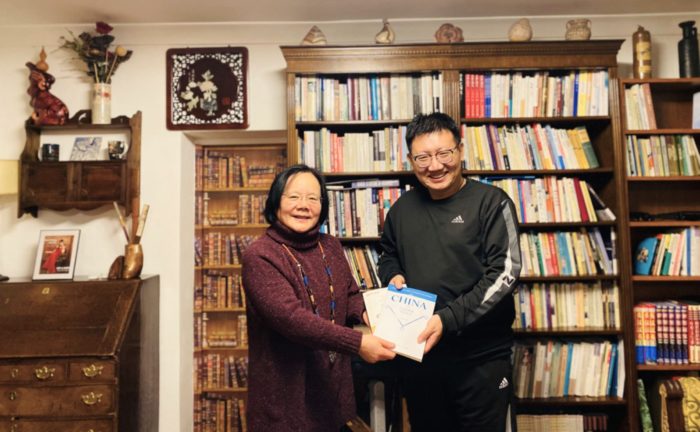
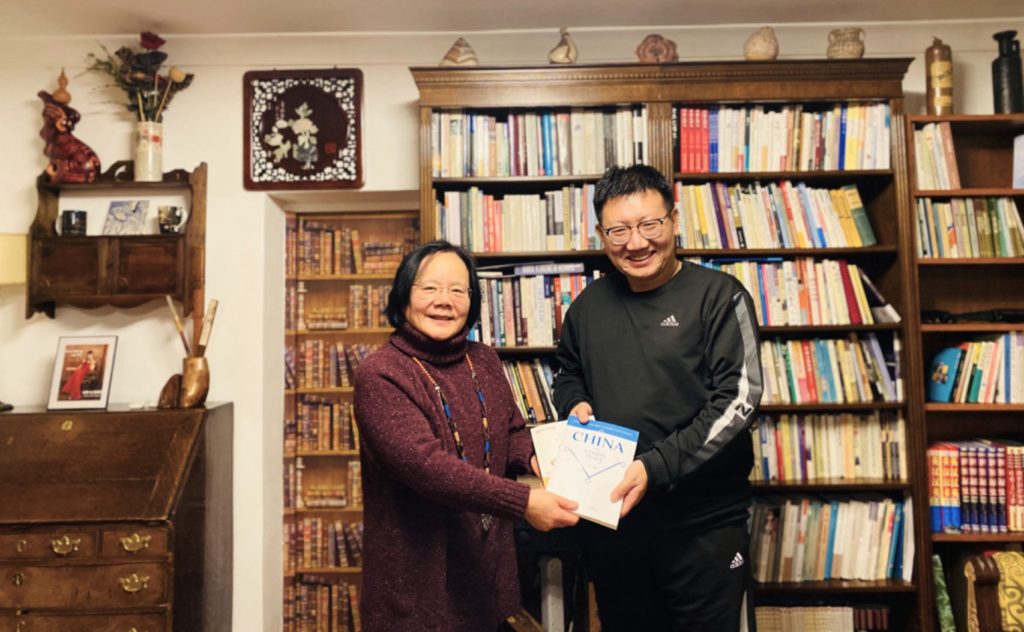
On January 5, 2024, Professor ZHAO Kejin, Deputy Dean of the School of Social Sciences at Tsinghua University, contacted me to inform me that he would be visiting the UK in two weeks, with a meeting scheduled for January 20. Coincidentally, Professor FANG Lili, Distinguished Chief Professor at Southeast University, planned to bring a few copies of her book, Fei Xiaotong’s Inquiry: How Human Society Can Achieve ‘Beauty in Diversity and Shared Harmony’ (《费孝通之问:人类社会如何走向“美美与共”》Beijing: Commercial Press, 2021), to the UK as a gift for me and the academy.
Professor Fang was the last postdoctoral researcher supervised by the renowned Chinese anthropologist and sociologist Fei Xiaotong (1910-2005) at Peking University. During our visit to the United States in 2019, she summarized her understanding of Fei Xiaotong’s thoughts to me: In his early years, Fei was primarily concerned with ecological issues (the relationship between people and the land) and how China could achieve modernization. In his later years, he focused more on the issue of ‘mentality’ (人心, the relationship between people), considering how mutual understanding between individuals, as well as harmony between ethnic groups and nations, could lead to a world beyond the divisions of civilization and barbarism, or East and West, toward achieving ‘beauty in diversity and shared harmony’ in human society. [Note 1]
The above contact occurred just three weeks after Professor LI Qiang (1950-2023) passed away. LI Qiang served as Dean of the School of Social Sciences and Humanities at Tsinghua University and was the Founding Dean of the School of Social Sciences (two terms). He was also the Honorary Chinese President of the Global China Institute and the Chinese Chair of the Global China Academy Council. Recommended by Professor LI Qiang, Professor ZHAO Kejin traveled to London to participate in the 6th Global China Dialogue: Governance for World Peace at the British Academy and participated online in the 7th Global China Dialogue: Reforming Global Governance in 2021. Professor ZHAO Kejin’s visit in summer holds significant meaning for the academy, symbolizing a continuation and development of past efforts.
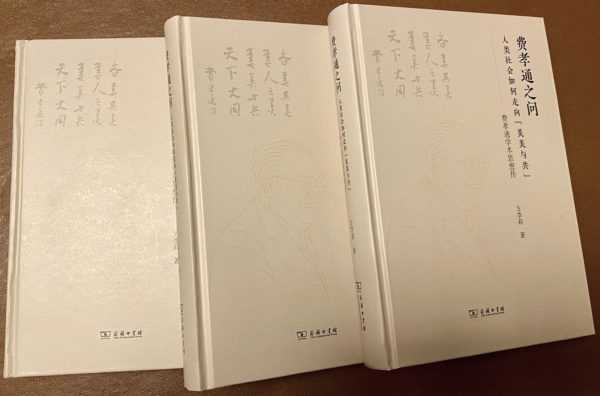
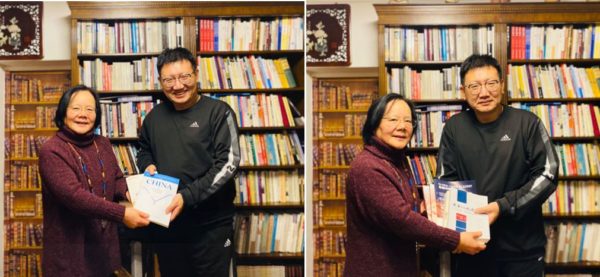
During his visit to the UK, Professor Zhao brought FANG Lili’s book on Fei Xiaotong’s thoughts, along with his own book China & Global Peace (Gale Asia, 2020) and other titles. I, in turn, presented ZHAO Kejin with my book Guanxi or Li shang wanglai?: Reciprocity, Social Support Networks, and Social Creativity in a Chinese Village (Chinese edition, Liaoning People’s Publishing House, 2009), as well as the Global China Academy leaflets and the brochure for the 7th Global China Dialogue.
Later, Zhao Kejin told me that Professor LI Qiang had left a will asking them to maintain the relationship with the Global China Academy (GCA). From ZHAO Kejin’s different expressions in the above photos, it might suggest that we discussed a serious topic. ZHAO Kejin proposed visiting the UK in the summer and mentioned that he might bring a delegation from Tsinghua University, possibly with delegations from other universities in China. For the Global China Academy, which serves as a platform to promote academic exchange between China and the world, this would undoubtedly be a great opportunity.


For dinner, I prepared a Western-style meal for Professor ZHAO Kejin and his PhD student ZHAO Danyang [Note 2].
- Starter: The pumpkin soup is a French-style dish, mainly enjoyed during the autumn and winter seasons. Although this soup appears simple, nutritious, and delicious, it was not easy for someone like me, who is not skilled in cooking, to make. First, the pumpkin needs to be peeled, deseeded, and cut into small pieces. These are then sautéed with onions, garlic, and other ingredients before adding broth and seasoning, and cooking until soft. After cooking, the soup is strained, and cream is added for a smoother texture. The soup is garnished with a dollop of yogurt and mint leaves, whose fresh flavor adds a refreshing touch to the rich pumpkin soup, enhancing its layers of taste.
- Main Course (Large Plate): Cheeseburger Loaded Fries. This dish is typical of American fast food, combining classic burger elements such as beef mince, cheese, tomatoes, onions, and burger sauce, which are layered over fries (instead of being placed between two buns), creating a dish that is rich, flavourful, and low in carbohydrates.
- Main Course (Medium Plate): Creamy Double Mushroom Penne is a classic Italian pasta dish. The combination of creamy sauce and two different types of mushrooms provide a rich taste and flavour, with the addition of cheese further enhancing the aroma and texture of the dish. However, to reduce carbohydrate intake, this dish was served not with penne but with a Mediterranean-style salad.
- Dessert: Fruit platter + snacks (details omitted).
Professor Zhao and Danyang appreciated the meal (photos provided by ZHAO Danyang). Our ‘International Cuisine’ concept and its practice, as reflected in this dinner experience, can be seen as an embodiment of Fei Xiaotong’s concept of ‘beauty in each culture appreciating the beauty of others’ (learning to appreciate different lifestyles and traditions) in everyday life, with the hope of achieving an understanding of ‘shared beauty in harmony’.
Note:
- Without a doubt, Fang Lili’s summary contributes to the understanding of Fei Xiaotong’s thoughts. However, from the corpus of The Complete Works of Fei Xiaotong, it can be observed that the term ‘ecology’ is mentioned a total of 304 times, all of which appear after Volume 8 (1957); the term ‘cultural ecology’ is mentioned 61 times, mainly between Volumes 10 and 15 (1983-1996). The term ‘human mind’ (人心) is mentioned 43 times, appearing in various volumes after Volume 3 (1942); ’mentality‘ (心态) is mentioned 113 times, in Volumes 14-17 (1992-2004). The term ‘people-to-people’ is mentioned 116 times, with references in every volume starting from the first, with as many as 23 mentions in Volume 16 (1997-1999). The term ‘nation-to-nation’ is mentioned 9 times, appearing in Volumes 8-9 and 13-17, while ‘country-to-country’ is mentioned 6 times, in Volumes 13, 16, and 17. Volumes 16-17 collect Fei Xiaotong’s works from 1996 until his death. If we consider Fei Xiaotong’s later years starting from 1996 (at age 86), we can say that he expanded his reflections on ‘people-to-people’ relationships to include ‘nation-to-nation’ and ‘country-to-country’ relationships. However, to fully understand the connections between these terms and ‘cultural ecology’ and ‘mentality,’ much more research is needed.
- I previously used Gousto, a UK-based meal kit with environmentally friendly packaging that allows you to easily enjoy fresh and delicious meals at home with convenience and flexibility. This time, I tried Hello Fresh, a meal kit that operates in multiple countries, including the US, UK, Germany, and Australia, and offers fresh ingredients in a simple and quick way. However, after using it for a while, I decided to stop because I am more suited to low-carb dishes.
Xiangqun Chang, 30 January 2024
- Click here to view the Chinese version of the blog.
- Click here to view the page ‘GCA Life Fellow Korean Sociologist Professor HAN Sang-Jin Meeting Professor Xiangqun Chang at Seoul, January 2023.’
- Click here to the news ‘The Chinese Chair of the Global China Aacademy Council, Professor LI Qiang, passed away on the 12 December, 2023’.
- Click here to watch a video of Professor LI Qiang’s greeting for the launch of the Global China Academy as an academy at the 7th Global China Dialogue, on December 10th, 2021, at the British Academy.
- Click here to visit the GCA news & blog section.


